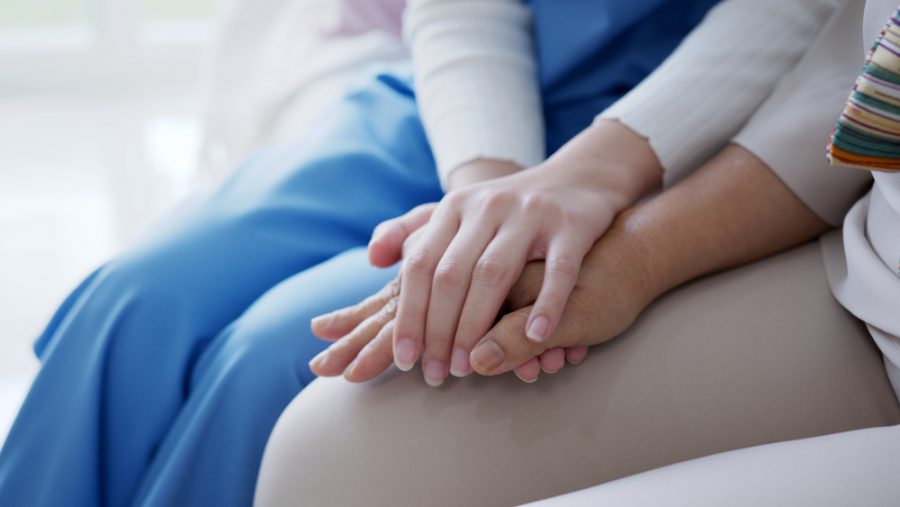When we think of nurses, we often imagine their work as it relates to their patient’s physical needs. From oncology and intensive care to orthopedic and labor and delivery, many branches of nursing do often revolve around the physical body.
But let’s not forget about the special sector of nurses specializing in mental health and wellness.
Just what is a psychiatric-mental health nurse?
PMH-APRNs help promote psychosocial health and well-being by caring for individuals with mental health conditions and behavioral issues.
If you’re curious about taking your career in this direction, you probably have numerous questions about the job description and potential career path. In this short guide, we’ll answer the question, “what is a psychiatric nurse,” queries about psychiatric and mental health nursing, and go over the steps on how to become a psychiatric nurse.
The Role of a Psychiatric-Mental Health Nurses
Are you passionate about breaking down the stigmas surrounding mental illness and helping individuals find the care they need to thrive?
If so, psychiatric and mental health nursing might be the career path for you.
Before embarking on further study, you’ll want to know what’s involved in the practice and how it differs from other areas of the nursing practice. While many duties within the nursing profession are standardized across the board, several others are specific to the type of nursing care being provided.
Here’s a look at some of the typical responsibilities of a PMHN:
- Designing, implementing, and reviewing care plans
- Tracking patient progress
- Administering medications
- Writing patient records and keeping them up to date
- Collaborating with other healthcare professionals to carry out a plan of care
- Aiding in crisis intervention
- Developing or improving coping strategies
- Participating alongside patients in recreational activities
- Conducting group therapy sessions
- Educating patients and families about mental health illnesses
- Prescribing medication (in some states)
While training for psychiatric nursing prepares nurses to adequately carry out each of these tasks, keep in mind that the full scope of work will depend largely on the work setting itself.
Where do Psychiatric Nurses Work?
Psychiatric mental health nurses can be found working in many of the same locations as other nurses, as well as in settings that are unique to just their branch of nursing.
Work settings for psychiatric mental health nurses may include:
- General hospitals
- Psychiatric hospitals
- Long-term care centers
- Physician offices
- Correctional centers
- Assisted living facilities
- Community mental health centers
- Rehabilitation facilities
- Private homes
In some facilities, PMHNs will work around the clock or on weekends, while in others, nurses may be asked to commit to a more traditional schedule. As you can imagine, a psychiatric nurse practitioner in a busy hospital setting will have a different day-to-day routine than a nurse traveling between private homes to see a list of patients.
Whatever the case may be, PMHNs will be part of a larger team, often working alongside psychiatrists, general physicians, occupational therapists, and social workers, to name a few.
Do you see any facilities that pique your interest on this list? When preparing for your clinical rotations in nursing, consider getting experience in these places to see if they would be a good fit for your long-term goals.
What Kinds of Clients do Psychiatric Nurses Work With?
Mental illnesses or psychiatric orders are often more common than we realize and can affect people of varying ages.
According to the National Alliance on Mental Illness, one in six youth (aged 6-17) and one in five adults experience mental illness or mental disorders each year in the United States. Combined, that equates to around 59 million people suffering from mental health disorders every year.
Because mental illnesses do not discriminate by age, gender, or socioeconomic level, psychiatric-mental health nurses can work with children, adolescents, geriatrics, and everyone in between.
Here’s a look at some of the common illnesses and disorders experienced by the clients PMHNs serve:
- Depression
- Bipolar disorder
- Schizophrenia
- Dementia
- Eating disorders
- Panic attacks
- Post Traumatic Stress Disorder (PTSD)
- Postpartum depression
- Psychoses
Some psychiatric nurses will pursue coursework and rotations that prepare them to work with a specific population.
Specialized Fields for Psychiatric Nurses
While there are several branches of nursing, mental health nursing offers its own subcategories of practice, too. Students choosing to study psychiatric mental health nursing may decide to direct their education toward a particular niche and follow a course of action that provides them with the proper experience for that area of interest.
Some specialized fields within psychiatric and mental health nursing are:
- Forensics – Psychiatric nurses specializing in this field play an important role in bridging the judicial and healthcare systems. Forensic psychiatric nurses work both with criminal offenders and victims of crime, often providing court-ordered psychiatric evaluations and servicing individuals with mental illnesses in correctional institutions.
- Substance Abuse – With a particular emphasis on providing mental health and emotional support services, substance abuse nursing works to provide a pathway to treatment and rehabilitation for individuals struggling with substance abuse and addiction. Nurses in this field may work in substance abuse treatment facilities, mental health clinics, or psychiatric wards.
- Addiction – Aside from chemical addiction, which can be an underlying cause of substance abuse, psychiatric nurses may also specialize in behavioral addiction. Sex, gambling, and exercise addiction are common behavioral addictions that require intervention from a team of psychiatric health professionals. Though studies are still emerging about social media addiction, this, too, could be proven as a serious mental illness affecting younger generations in the years to come.
- Geriatrics – Geropsychiatric nurses are specialized in evaluating and treating older adults facing an array of mental health challenges. Common illnesses treated by these kinds of nurses include dementia, addiction, depression, and anxiety caused by fear of isolation or fear of death.
- Pediatrics – Children and adolescents living with autism, ADHD, depression, and other conditions are affecting their mental health may receive services from a pediatric psychiatric nurse. In addition to caring for children, nurses in this field will work alongside families of the patients they serve, providing educational resources and family therapy sessions for mental health care.
- Eating Disorders – While bulimia, anorexia, food addiction, and other types of eating disorders are often considered to be physical illnesses, they are frequently linked to mental health as well. Psychiatric nurses in this specialized field may work in hospitals or recovery centers. They are often an integral part of the rehabilitation process for this category of patients.
Steps to Becoming a Psychiatric-Mental Health Nurse
Before we get into how to become a psychiatric nurse, Do you have what it takes to enter the field of psychiatric nursing? Nurses who possess the following qualities will be able to set themselves apart from the rest, making them exceptional candidates for this particular job.
- Resilience and grit – Mental health nurses are met each day with the unexpected. Patient mood swings can be unpredictable, and changes in behavior can be sudden or sometimes even aggressive. The ideal psychiatric nurse is adaptable, level-headed, and resilient in times of emotional and mental distress.
- Empathy and compassion – A kind heart and a sincere commitment to understanding what patients are going through can take nurses far in this field. The ability to create a safe, understanding space for patients to receive treatment is considered indispensable.
- Communication – While effective communication skills can be found at the heart of many professions, it’s an absolute necessity for mental health nursing. Leading with a listening ear goes a long way in helping patients feel valued, and it can be an essential strategy for pinpointing the sources of patients’ illnesses.
Training and Certification
All psychiatric-mental health nurses will need to step up to a standardized plate of certifications required within their field. These include:
- Obtaining a nursing degree. Options include a two-year Associate’s in Nursing (ASN) or a four-year Bachelor’s of Science in Nursing (BSN).
- Passing the NCLEX (National Council Licensure Examination) and registering as a nurse practitioner in your state of residence.
- Getting two years of work experience and completing 30 hours of continuing education in psychiatric nursing.
- Completing advanced practice nursing program or PMHNP program to receive national certification through the American Nurses Credentialing Center.
For more detailed information, check out our guide on How to Become a Psychiatric Nurse.
Psychiatric Nurse Career Outlook
Besides the reward of supporting patients through mental health issues, how much can psychiatric nurses expect to make?
Psychiatric nurses working in substance abuse hospitals make a median salary of $69,460 per year—over $1,000 higher than the average RN.
Keep in mind that your salary largely depends on where you practice. Likewise, additional training and experience can lead to wage growth. For example, psychiatric nurse practitioners (NPs) usually earn more than RNs.
Explore Psychiatric Nursing with Host Healthcare
At Host Healthcare, we’re always looking to connect with healthcare professionals who understand the value of supporting mental health. And, as you learned in this blog, this kind of nursing can serve people of all ages, and it can be practiced in many locations.
Why not expand your horizons as a travel nurse? Wherever you dream of practicing, connecting you with an appropriate path based on your interests and expertise is what we do best.
If you are a mental health nurse who exudes compassion and grit, dive into the rewarding journey that our psych travel nursing jobs offer.
Sources:
- American Psychological Association. Psychiatric nursing. https://dictionary.apa.org/psychiatric-nursing
- National Alliance on Mental Illness. Mental Health By the Numbers. https://www.nami.org/mhstats
- Nursing Assignment Helper.12 Interesting Facts about Psychiatric & Mental Health care nursing in 2019.
- https://nursingassignmenthelper.com/12-interesting-facts-about-psychiatric-mental-health-care-nursing-in-2019/
- Provo College. The 16 Highest Paid Nursing Jobs in 2021. https://www.provocollege.edu/blog/highest-paying-nursing-categories/











